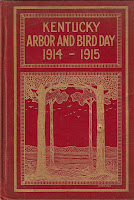Goals for the 1915 farmer
The following was published about 1915.
The Farmer's Creed
I believe in a permanent agriculture; a soil that will grow richer rather than poorer from year to year.
I believe in 100-bushel corn and in 50-bushel wheat, and I shall not be satisfied with anything less.
I believe that the only good weed is a dead weed, and that a clean farm is as important as a clean conscience.
I believe in the farm boy and in the farm girl, the farmer's best crops, the future's best hope.
I believe in the farm woman and will do all in my power to make her life easier and happier.
I believe in the country school that prepares for country life and a country church that teaches its people to love deeply and live honorably.
I believe in community spirit, a pride in home and neighbors, and I will do my part to make my community the best in the State.
I believe in the farmer, I believe in farm life, I believe in the inspiration of the open country.
I am proud to be a farmer, and I will try earnestly to be worthy of the name.
--By Frank I. Mann.
Source: Kentucky Arbor and Bird Day 1914-1915, compiled by Mrs. V. O. Gilbert. Published in Frankfort, Kentucky by the State Journal Company, no publishing or copyright date given.
After I read "The Farmer's Creed", I was quite curious about whom Mr. Frank I. Mann might have been. Of course, I decided to do some internet searches, and I soon found a Frank I. Mann mentioned in an online book. He seems a likely suspect:
On his 500-acre farm near Gilman, in the heart of the Illinois Corn Belt, Mr. Frank I. Mann has produced a 70-bushel average yield of corn for a five-year period, and with 200 acres of land in corn annually. It cost him only $1 an acre a year in fine-ground natural rock phosphate to produce increased yields of 16 bushels more corn, 23 bushels more oats and 1 ton more clover than the average yields secured without adding phosphorus.Mr. Mann's soil improvement methods are discussed for several paragraphs beyond the one that I quoted above. I think he was also an editor of a farm newspaper, the Prairie Farmer, and the author of Frank Mann's Soil Book: How One Illinois Farmer Has Doubled the Production of His Farm by Methods that Paid For Themselves as He Went Along.
Source: Chapter IV of the online book, The Farm That Won't Wear Out.
 A Google book search turns up over 30 mentions of "Frank I. Mann" in publications mostly from the early 1900's, and his name is associated with agriculture and/or Illinois in nearly every instance.
A Google book search turns up over 30 mentions of "Frank I. Mann" in publications mostly from the early 1900's, and his name is associated with agriculture and/or Illinois in nearly every instance.I'm not at all sure why "The Farmer's Creed" was included in the Kentucky Arbor and Bird Day 1914-1915. The introduction to the book states that it is a source of information and exercises for Arbor Day, November 6, 1914, in order to draw attention to the importance of planting trees. I don't see anything at all about planting trees in the creed!
I noticed in the book search that "The Farmer's Creed" was also included in The Connecticut School Document of 1914-1915. I guess they thought it was good, inspirational reading for children.
I know you're just fascinated with this stuff. That's why I post it for you.


Related post: The Country Boy's Creed
Technorati tags:
6 comments:
I do love this stuff. Just listened to "This I Believe" on NPR driving home from work. In some way we are all trying to define our creed, clarify what we believe.
The lucky people are the ones who can write a creed, I guess. They have it all figured out and can even verbalize it!
Nice cover on the book, too, don't you think? I think that drawing might be an example of Art Nouveau style?
Received by email from Nancy Mann Germanetti:
My younger brother recently came across your article of March 17, 2007 regarding The Farmers Creed. You are correct-Frank I. Mann of Illinois did write that. He was THE editor of The Prairie Farmer, indeed he started the magazine. He was one of 6 brothers. His father William Henry Mann fought as a Texas Ranger against Mexico, founded the town of Mannville in Florida and then returned to the Gilman area where the 6 sons were born. He also served in the army in the Civil War. Another of his sons was James R. Mann, the US Representative from Illinois who wrote the Mann Act and the Pure Food and Drug Act. Another son was my great-grandfather William A. Mann, an Ear, Nose and Throat surgeon in Chicago.
As small kids, my family would drive from Chicago every fall to visit Uncle Frank on his farm to pick out our Thanksgiving turkey.
Hope this was of some interest to you. We certainly enjoyed reading your article.
My father worked for Frank I. Mann in the early 20th century in Gilman. I have a photo of his beautiful home and of Mr. Mann himself. My father had a great respect for Mr. Mann. Lois Sellarsinedsh
My grandmother is Virginia Mann Moore what a wonderful family I was born into. I have been to the house in Gilman Illinois growing up . Linda bridge's
I am the granddaughter of Virginia Mann Moore my grandparents took me several times to the house in Gillan Illinois. Linda Bridges Mendoza
Post a Comment